Ahead of next year’s elections, Arizona is gearing up for a special election this year and several key races in 2026.
This head start is much needed in the Southwestern swing state, where the political landscape is extremely nuanced and every seat counts.
On the one hand, six of the nine members of the U.S. House delegation from the Grand Canyon State are Republican. Meanwhile, Democrats control both the Senate seats as well as the offices of governor, attorney general and secretary of state.
The state legislature is red by a razor-thin margin.
Despite their political differences, both parties are running into similar problems, including a lack of support from the fractious state parties.
High-level Republicans appear to be relying on Turning Point USA, an independent political organization that is loyal to President Donald Trump.
Turning Point USA, headquartered in Phoenix, gained a reputation for driving voter turnout toward MAGA-aligned candidates. In 2024, this political advocacy organization reported turning out over 315,000 voters in Arizona alone. That’s a big accomplishment in a state that has only about 324,000 more registered Republicans than Democrats.
When the Arizona Republican Party drew the line at election denialism in 2020 and 2022, Turning Point USA continued to support the likes of Kari Lake, who unsuccessfully ran for Senate and the governor’s office and claimed the election was stolen both times.
State Democrats, including Gov. Katie Hobbs and Attorney General Kris Mayes, are also making changes.
In May, state Democratic Party Chair Robert Branscomb II, elected to office earlier this year, criticized top Democrats and accused Sens. Mark Kelly and Ruben Gallego of intimidation over staffing decisions.
In response to the internal dysfunction, Branscomb was censured and an upcoming vote could see him removed from leadership.
In the meantime, the top Democratic candidates are coordinating their fundraising and voter turnout efforts through the more organized Navajo County Democratic Party.
The perpetually close margins in federal, statewide and local races and the never-ending talk of election security amps up the pressure on Arizona’s wide range of candidates.
As both parties prepare for an uphill battle, here are three races to watch.
Special election
Democrats: The 7th District in Arizona is up for grabs at the special election this year after Democratic Rep. Raúl Grijalva died in March. He was 77.
His daughter, Adelita Grijalva, was declared winner of the Democratic primary on Tuesday night. Daniel Hernandez, a Democrat, who helped save the life of former Rep. Gabrielle Giffords during a shooting in Tucson in 2011, and 25-year-old Deja Foxx lost out to Grijalva.

GOP: Daniel Butierez, a painting company owner, was projected to beat two other Latino American businessmen — off-road vehicle entrepreneur Jimmy Rodriguez, and restaurateur Jorge Rivas, in Tuesday’s primary. The trio overall supports Trump’s crackdown on undocumented migration.
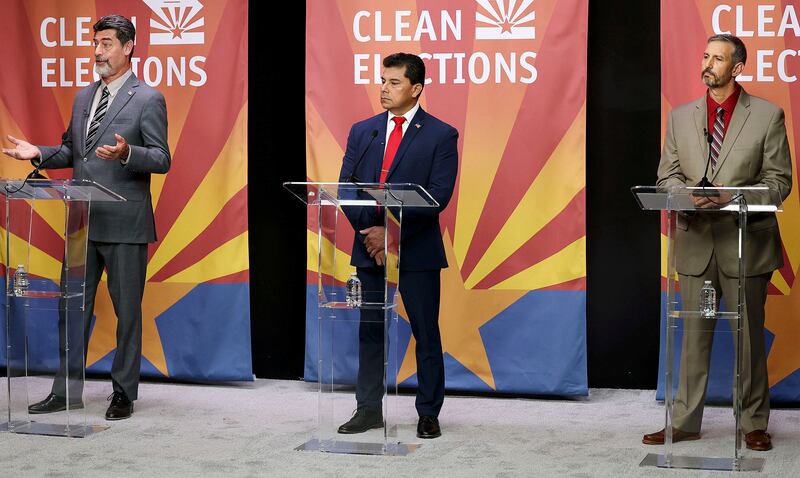
What’s at stake?: It will be a tough battle for Butierez; this seat has never been held by a Republican since it was created in 2000.
Governor’s race
GOP: Rep. Andy Biggs, R-Ariz., kicked off his campaign for governor last month through an energized rally, hosted by Turning Point USA, which has as much influence in Arizona as the state party.
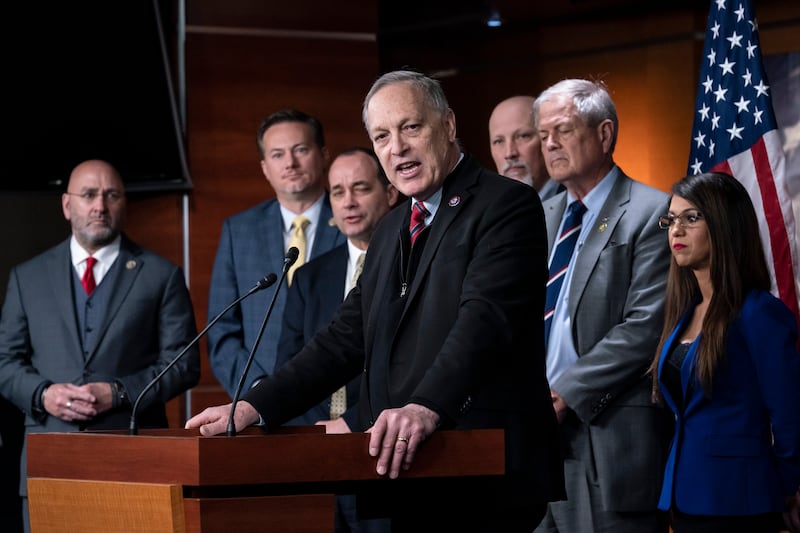
He shares an endorsement from Trump with attorney Karrin Robson, who enjoys support from the Arizona Republican Party and has a much bigger war chest than Biggs’.
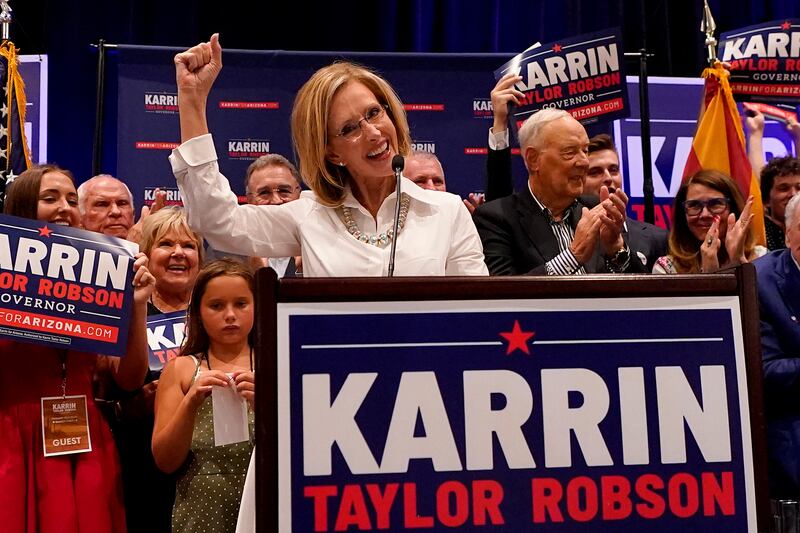
Democrats: They are so far backing incumbent Gov. Katie Hobbs, who’s earned the nickname the “Veto Queen” for setting and breaking her own veto records over the course of her term. Although she won against Kari Lake, who is now part of the Trump administration, Hobbs faces a tougher battle in 2026.

Odds: So far, Hobbs hasn’t said whether she will run for reelection. If Hobbs jumps into the race, her chances of winning are low. According to Sabato’s Crystal Ball, from the Center for Politics at the University of Virginia, the race, which has at least 13 other candidates, is a toss-up, despite Hobbs’ incumbent status.
Attorney general
Democrat: Attorney General Kris Mayes, the incumbent Democrat, is running for a second term. She is the first LGBTQ person and first mother to serve in this role. Those aren’t the only notable headlines about her win — in 2022, she won by a narrow margin of 280 votes.
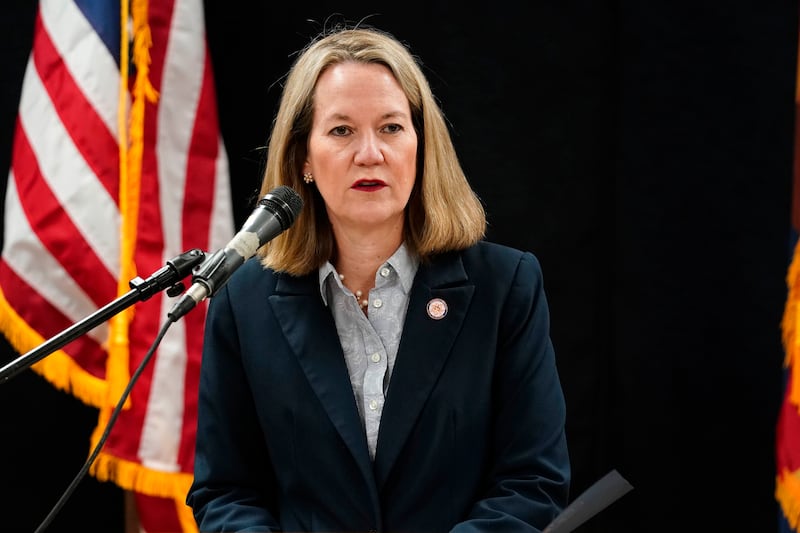
If that race is any indication, the upcoming election, too, will be a tough battle, especially since Mayes isn’t universally popular in the state. Republicans accuse her of using her position to target the right, like suing the federal government for the Department of Government Efficiency’s cuts, a legal battle she lost.
GOP: She faces opposition from Rodney Glassman, who previously ran as a Democrat in 2010, and Warren Petersen, the president of the Arizona Senate.
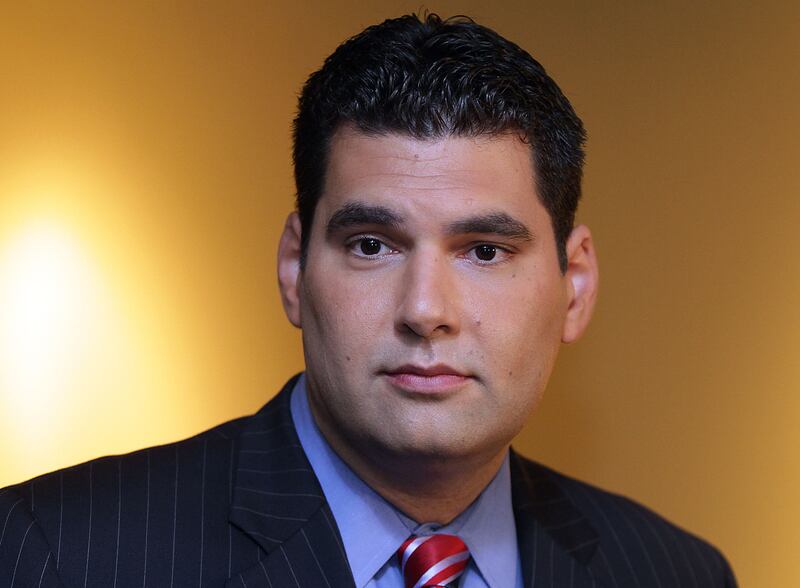
Petersen doesn’t have Trump’s endorsement but he was invited to the White House when Trump signed the executive order to disallow trans athletes from participating in competitive girls and women’s sports. He had fought for the passage of a similar bill — the Save Women’s Sports Act — in the Arizona legislature.

What’s at stake?: In addition to standing up against “woke” policies, Petersen promises to prioritize fighting against rising crime, fentanyl overdoses and human trafficking in lockstep with the Trump administration’s border security agenda.
He is the front-runner in the GOP primary. Meanwhile, wealthy ex-Democrat Glassman’s track record has lost several races, including the bids for chair of the Arizona Democratic Party, Arizona Corporation Commission, Maricopa County assessor, and the Republican nomination for attorney general, as Phoenix New Times reported.


